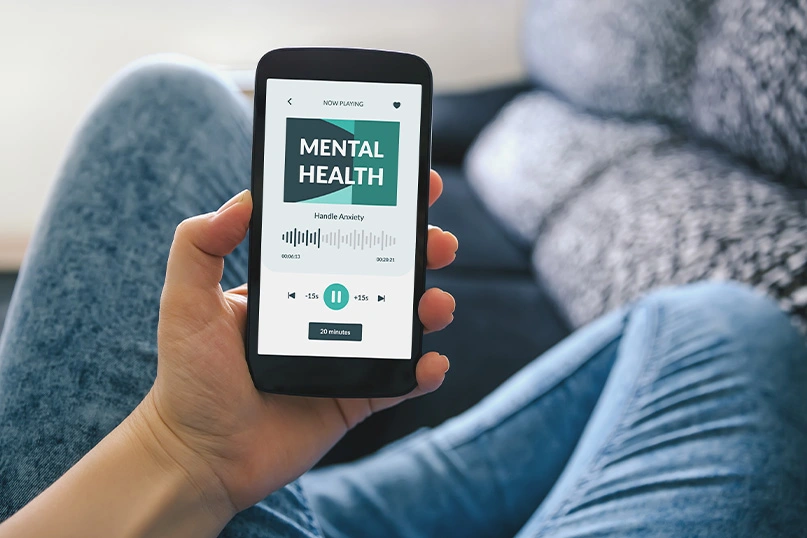Mindfulness apps lower blood pressure by teaching you ways to relax and breathe deeply. These apps guide you through calming exercises like meditation. When you use them, you can calm your mind, and your body feels relaxed. This is good for your heart. Keeping calm helps keep your blood pressure normal. Regular use of these apps can make a big difference in your health. They help you learn to handle stress better, which is very important for keeping your blood pressure low.
The Mind-Heart Connection: How Mental Health Impacts BP
Mental well-being strongly affects your blood pressure. Stress and anxiety can quickly raise it. If stress lingers, it may cause lasting high blood pressure. Mental health apps are vital for managing stress and improving overall health.
Mental wellness apps like Moodfit provide useful features:
- They help track your mood every day.
- They guide you through calming mindfulness exercises.
- They teach ways to handle stress better through cognitive behavioural techniques.
These tools help you keep a regular check on your mental health. This routine is key in controlling stress, which can help manage your blood pressure effectively. Using these apps regularly can build strong habits. These habits make it easier to manage stress. Lower stress means better blood pressure control.
Incorporating these apps into your daily life takes positive steps towards better mental and physical health. This helps keep your blood pressure normal. These apps support your health alongside traditional treatments. They make managing your blood pressure simpler and more effective.
Best Mental Health Apps for Blood Pressure
Good mental health helps keep blood pressure in check, avoiding hypertension. Here are some top apps in India that can help:
- Moodfit: This app helps you track how you feel each day. It gives you ways to calm your mind and feel better. It uses simple activities that teach you how to handle stress.
- Calm: This app helps you relax. It has many meditation guides that make you feel less stressed. Less stress can mean better blood pressure.
- Headspace: This app teaches you how to meditate. It helps you learn to calm your thoughts and breathe deeply. This can make you less stressed and help your heart.
- Sanvello: This app offers tools to fight stress, worry, and sadness. It uses tips from doctors to help you feel better. Feeling less stressed can help keep your blood pressure low.
- Manas: This app is supported by the Indian government. It helps you look after your mind. It teaches you how to relax and manage stress. This is good for your heart and blood pressure.
Using these apps every day can help you take care of your mind. This is good for your heart too. They teach you how to breathe, relax, and handle stress. This can help keep your blood pressure normal.
Benefits of Mental Health Apps for BP
Anxiety and blood pressure apps are great for helping you keep your blood pressure in check. Here’s why they work well:
- Stress Relief: Apps like Calm and Headspace offer meditation and breathing exercises. These activities help calm your mind. A calm mind can mean lower stress. Lower stress helps keep your blood pressure down.
- Positive Thinking: Apps like Moodfit and Sanvello give you tools to change negative thoughts into positive ones. When you think positively, you feel less stressed. This can be good for your blood pressure.
- Healthy Habits: Using these apps every day helps you form good habits. For example, manas, supported by the Indian government, teaches you to relax and manage stress every day. Good habits from these apps can lead to better blood pressure control.
- Mood Tracking: Knowing how you feel each day is important. Moodfit lets you track your mood. This helps you see what makes you stressed. Understanding your stress can help you manage it better.
- Learning: Many apps teach you about stress and how it affects your body. They show you ways to manage stress. Learning how to handle stress is good for keeping your blood pressure healthy.
These apps help you relax, think better, and learn about stress. They show you how to manage stress well. Managing stress well is important for keeping your blood pressure healthy.
Challenges and Future Directions
Mental health apps help a lot with blood pressure. However, there are challenges to fix and new steps to take.
- Getting the Apps to Everyone: Right now, not everyone can use these apps. We need to make them easy for all people to get and use.
- Keeping Information Safe: These apps know a lot about our health. It’s very important to keep this information safe so nobody else can see it.
- Working with Doctors: These apps need to work well with doctors’ systems. This makes it easier to watch and manage blood pressure.
- Making Sure Apps Really Work: We need to make sure these apps really help. Scientists should check the apps to see if they do what they say.
- Using AI to Help More: AI can make apps better at knowing what each person needs. This makes the app better at helping with blood pressure.
- Building a Community: If these apps can help us talk to other people who use them, it can make us feel better. It’s nice to know others are with us.
Conclusion
Mental health apps, especially meditation apps for hypertension, play a vital role in managing blood pressure. These apps not only help reduce stress through guided meditation but also promote a healthier lifestyle, which is crucial for controlling hypertension. By integrating daily meditation practices from these apps, individuals can significantly enhance their overall health and well-being. As technology evolves, these tools become even more accessible and effective, supporting users in their journey towards a healthier life.
However, it is important to note that these are not replacements for actual medical interventions. They are not to be used as primary healthcare option in case of debilitating mental disorders, even though they may be able to aid in times of need and alleviate certain symptoms. It is paramount that you visit a behavioural health specialist in case you begin experiencing severe symptoms of depression and anxiety.
Disclaimer
The information contained in this article is to educate, spread awareness in relation to hypertension and other diseases to the public at large. The contents of this article are created and developed by BPinControl.in through its authors, which has necessary, authorisations, license, approvals, permits etc to allow usage of this articles on The Website. The views and opinions expressed in this article are views, opinions of the respective authors and are independently endorsed by doctors. Although great care has been taken in compiling and checking the information in this article, The Website shall not be responsible, or in any way liable for any errors, omissions or inaccuracies in this article whether arising from negligence or otherwise, or for any consequences arising therefrom. The content of this article is not a substitute for any medical advice. The Website shall not be held responsible or liable for any consequence arising out of reliance on the information provided in the article.




